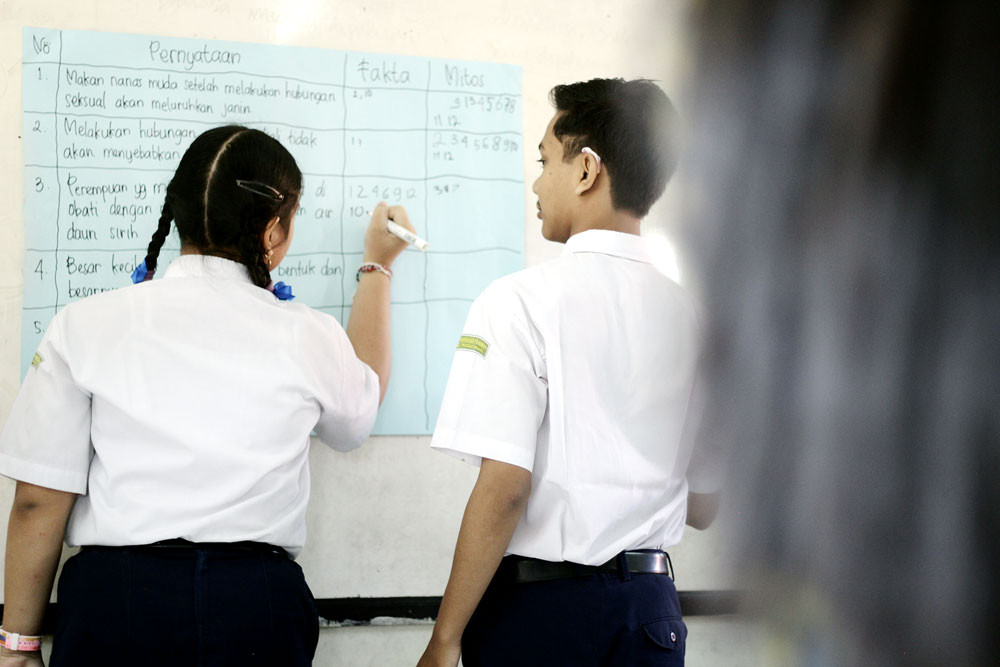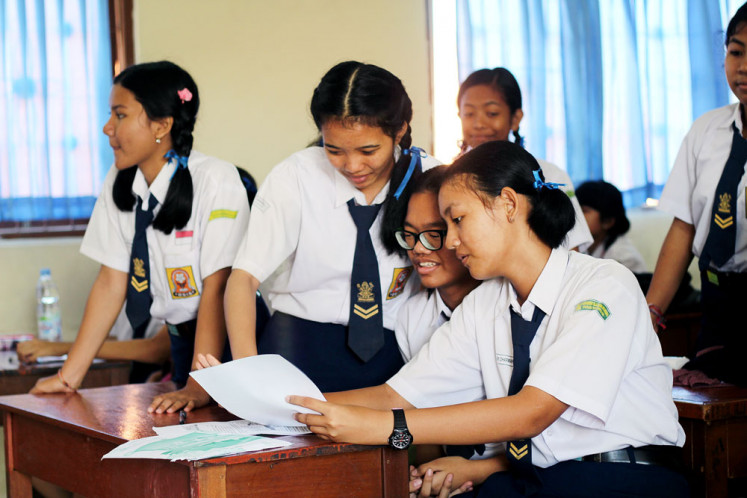Popular Reads
Top Results
Can't find what you're looking for?
View all search resultsPopular Reads
Top Results
Can't find what you're looking for?
View all search resultsExplore4Action to discover what youths really want
Adolescence may be the hardest chapter in a person’s life, the stage when an individual is defining who they really are.
Change text size
Gift Premium Articles
to Anyone
O
fficially defined as an individual between 10 and 19 years old by the United Nations Population Fund (UNFPA), adolescents from one generation to the next experience the most intense stage of personal development in dealing with so many pressures, from doing well in school to personal relationships, from fitting in socially and to strained communications with parents, teachers and even their peers.
In the current digital era of social media and social networking, the experience is even more pronounced with the tough competition for the most followers and the pressures of always looking “cool and Instagrammable”.
However, Center for Reproductive Health professor Siswanto Agus Wilopo at Gadjah Mada University (UGM) is of the opinion that one of the most important issues the majority of Indonesian adolescents face is urgent and timely access to education and services in sexual reproductive health rights (SRHR).
Adolescent sexual reproductive health (ASRH) has been overlooked, despite the high risks for the country in neglecting it.
“There are many teenagers who are not aware of their ASRH problems. They need to be screened for ASRH,” explains Siswanto.
With 68 million youths aged 10 to 24 years, Indonesia currently has one of the largest youth populations in the world at 28 percent of its 260 million population. The figure also comprises approximately 45.8 million adolescents aged 10-19 years, or 13.3 percent of the national population. By 2030, these adolescents will reach their 30s — their peak productive years.
“To ignore the demographic impacts of ASRH is unfounded, since Indonesia’s future is in the hands of these youth. The lack of special attention on this issue implies that Indonesia will have low-quality human resources, since leaving the ASRH issue unresolved will reduce [adolescents’] opportunities for better education and incomes. It will also affect the health of these youth,” Siswanto added.
Some of the challenges Indonesian youth face today include child marriage and early/unwanted pregnancies,
unsafe abortions, high rates of HIV transmission and other sexually transmitted infections (STIs).
A qualitative 2018 study conducted jointly by the UGM Center for Reproductive Health and the Johns Hopkins Center for Communication Programs (JHCCP), covering 18 municipalities and regencies in nine Indonesian provinces, reveals that the nation’s teens are becoming increasingly permissive in their sexual behavior.
Around 6 percent of adolescents have had sexual intercourse, while about 0.1 percent of both boys and girls have sexual intercourse for the first time at 15-17 years old.
Statistics Indonesia’s (BPS) 2013 data recorded about 22 million married boys and girls aged 15-19. Meanwhile, the Health Ministry’s National Basic Survey revealed that more than 42 percent of girls aged 15-19 were married.
UNICEF provides other convincing data that one out of nine Indonesian girls are married before they turn 16, and an estimated 500,000 adolescent girls in the country give birth every year.
Siswanto said that furthermore, common adolescent problems in Indonesia and other countries concern the enormous taboo on sexuality and sexual matters.
Adolescents, he said, were naturally curious and inquisitive about the changes they were experiencing, both in their physical development as well as romantic interests.
“But where can they go to with their questions? Many turn to friends or the Internet without any guidance to interpret what they see or hear, and this leads to many misconceptions and insecurities,” he noted.
To address these and other issues, Rutgers WPF Indonesia teamed up with the UGM Center for Reproductive Health and Johns Hopkins Bloomberg School of Public Health to recently launch the first comprehensive adolescent research and advocacy project, Explore4Action.
Nur “Nana” Jannah, Rutgers WPF Indonesia’s Explore4Action coordinator, explained that the project aimed to understand how adolescents experienced growing up and what factors undermined or promoted their healthy development and transition into adulthood.
Discussion: Junior high school students discuss the curriculum in class. (Courtesy of Rutgers WPF Indonesia/-)The program included qualitative ethnographic research as well as large-scale qualitative research through the Indonesian arm of the Global Early Adolescent Study (GEAS), she said.
GEAS follows adolescents aged 12-15 over four years to study how gender norms and attitudes affect their health and wellbeing.
“GEAS will evaluate how a reproductive health education intervention [SETARA], piloted by Rutgers and the Indonesian Planned Parenthood Association [PKBI] and involving local governments in several cities in Indonesia, impact this, by comparing school students who receive SETARA with those who do not,” Nana said.
The assumption is that SETARA builds essential life skills and understanding of respect and consent that will help protect adolescents from adverse experiences like sexual harassment, increase their self-confidence and help them make informed choices.
Explore4Action is grounded in the recommendations that emerged from the first National Adolescent Reproductive Health (ARH) summit, held in Yogyakarta in 2017.
“Young people in Indonesia currently face a lot of contradictions in society,” Nana said.
“Their knowledge about sex is limited since sex education is not taught formally, whether at school or at home. Information from television, the Internet and other sources is readily accessed, but accuracy remains a problem,” she added.
Nana said that the program also aimed “to get as close as possible to the real lives of adolescents, their experiences, feelings, issues, concerns, and how they deal with challenges”.
The issues of adolescent reproductive health are sensitive and complex, while there is a strong need to provide more guidance to adolescents in this rapidly changing world through correct information and life skills.
“What we bring to the table trough Explore4Action are the most recent insights and methods through science and [scientific] wisdom,” says Nana.
“Only when we earn young people’s trust in sharing their personal feelings, experiences and ideas, will we able to understand if we — as parents, teachers, health workers, government and society at large — are providing the right support for them to prevent issues that could harm their health and wellbeing, and to cope with these when they occur,” she said, adding that the research project would provide people with many new and relevant insights that conventional research could not.
Explore4Action, which was launched in April 2018 in Nusa Dua, Bali, commenced in July 2018 and is to run until 2021. The project involves around 4,000 junior high school students in the Central Java city of Semarang, Sumatra’s Lampung province and Bali’s provincial capital of Denpasar.
Explore4Action presented its preliminary findings at the fifth International Conference on Family Planning (ICFP) on Nov. 11, 2018 in Kigali, Rwanda.
SETARA brings reproductive health to classrooms
When it comes to education on sexual reproductive health (SRH), misunderstanding and suspicion persist.
Sexual reproductive health education has always been a critical issue confronting young people, educators, parents and society at large.
Robert Blum, a professor at the department of Population and Reproductive Health at Johns Hopkins Bloomberg School of Public Health, said that in Indonesia and many neighboring countries, SRH remained a taboo topic never discussed at home or taught in schools.
“These youth are often missing out in important information that, in many cases, can save their lives,” said Blum, who conducts research and studies on youths around the world and is now involved in a four-year Explore4Action project together with the Gadjah Mada University and Rutgers WPF Indonesia.
Very few sources of information and service providers exist for Indonesian youths. Moreover, SRH messages often focus on physical aspects, such as the prevention of sexually transmitted diseases or family planning — topics that may not resonate with the youth, he added.
“Instead, educators or advocates should link SRH with topics related to boosting youth’s self-worth, self-esteem and feeling good about their bodies, their future and developing healthy relationships with female and male friends,” the professor said.
To equip local students with accurate information on SRH issues, NGO Rutgers WPF Indonesia piloted a school curriculum called Semangat Dunia Remaja (SETARA or Teen’s Aspirations), which was based on the World Starts With Me (WSWM) global program developed by Rutgers.
In 2010, UNESCO’s international technical guidance on sexuality education recommended WSWM as one of 18 comprehensive programs in the field worldwide. With technical support from Rutgers, WSWM was adapted to the Indonesian context and specific age group.
In Indonesia, SETARA has been implemented in the classroom since 2013 in Jakarta, Bandar Lampung in Lampung; Semarang, Central Java; Denpasar, Bali; Sukabumi, West Java; Rembang, Central Java; and Bogor, West Java.
To implement the program, Rutgers WFP Indonesia works with partners such as the Pelita Ilmu Foundation in Jakarta, International Planned Parenthood (PKBI) Yogyakarta, Lampung, Bali and Sikok Foundation in Jambi.
All the interviewed students and teachers at SMP Saraswati junior high school in Denpasar asked to remain anonymous in discussing the sensitive topic.
“SETARA is fun with games. It is creative, modern. It is not boring like biology,” said 14-year-old Ratih (not her real name).
“This makes me curious to know more about reproductive health, and I get information about menstruation and menstrual health. I didn’t know about personal hygiene before,” she said.
“The first time for me to hear about reproductive health is from SETARA. I used to get angry at friends easily, but through SETARA, I learned about stress management. Now I know how to handle emotions,” a boy stated.
“I like the part when we discuss about ‘the world starts with me’. It is a game when we write down things about ourselves and share those to someone close to us. I learn to listen to other friends. Now I know more about what they like and dislike. People are different, but it is okay. Also, I start to understand myself better,” said Hanny, 14.
“I support SETARA, because I have found there are many cases happening with students right now; it is a reality. I am really worried about the development — they bring [pornographic] pictures to the public sphere [classroom]. I want to help them with dating the healthy way. These are millennials, they access the Internet,” said a teacher who declined to be named over the sensitiveness of the issue.
“We realized these cases are here too, we cannot deny it; but sometimes we as teachers do not have the capacity to discuss them. But SETARA is a tool to discuss it. Other teachers can benefit.”
She said her role was to understand the students better and communicate with them on how to protect themselves from vulnerability and risk. “SETARA improved my interaction with them. It is not about the topic, it is about life skills, about yourself as a person,” the teacher said.
“It is a shame that we implement SETARA only at a few schools. I urge the Denpasar municipal government to expand it to more classes and schools.”








